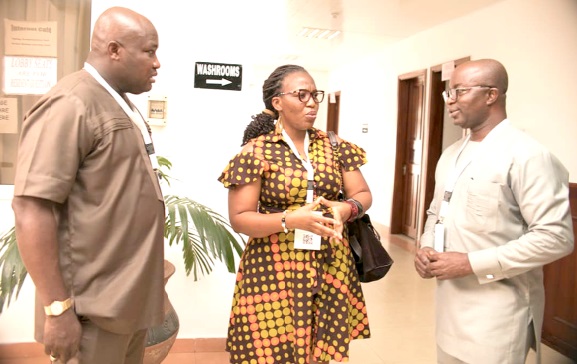
National Service, tertiary institutions collaborate to create employment opportunities
The National Service Scheme (NSS) is collaborating with over 250 tertiary institutions to establish employment training programmes at each school to ensure that national service personnel are readily employable or set up their own businesses after service.
Already, the Kwame Nkrumah University of Science and Technology (KNUST) has assisted service personnel to establish a real estate entity to construct building for teachers, while together with University of Professional Studies (UPSA), it had assisted personnel to establish business incubation.
The Executive Director of NSS, Mr Osei Assibey Antwi, who announced this at a stakeholder conference in Accra yesterday, said the scheme was seeking to go beyond just deployment and offer employment.
The conference which attracted over 300 principals and registrars of both public and private tertiary educational institutions was on the theme
“Strengthening GNAA Database through Digitalisation for Efficient Deployment”.
“We want to make sure that national service has at least one project with every university in the country. All the projects will gear towards creating employment,” Mr Assibey Antwi added.
The move which is a major boost to complement government’s employment generation agenda is also coming out with an electronic job platform to absorb all completing personnel and appropriately match their skill sets for companies in need of their services.
Mr Assibey Antwi said the employment drive fell within its new vision of not only deploying the personnel but ensuring that they either become self-employed, offering employment for others and also be ready for employment under broader scheme of “Deployment for Employment”.
Models
Some of the models for training and employment include Pathways to Sustainable Employment (PaSE), Project Ghana Tech Lab (GTL), which is currently training a lot of service personnel in mobile apps and websites building skills; Venture Building Programme which is grooming Service Personnel with entrepreneurship skills throughout the service year and GNSS.
Mr Osei Assibey said although the scheme was not deviating from the dictates of Act 426 (1980), it was determined to be innovative in meeting the socio-economic needs of the Ghanaian graduate.
“Over the years, we have traditionally deployed personnel for their national service after which many of them are left without meaningful employment”, he said, and added that to close this gap, management has engaged the services of a consultant to draft a policy document.
Pen-drive
Touching on the new platform for transmitting list, he indicated that over the years tertiary institutions have submitted their class list on pen drives, through emails, and hand copy which were susceptible to manipulation, errors due to multiple desktop processing, delayed processing due to time spent correcting mistakes and causing stress to the graduates.
Mr Osei Assibey explained that the new NSS digitalised class list submission system offered secured interactive platform for the institutions and the national service for smooth, efficient and effective ways to provide secured and real time data.
The Board Chairman of the NSS, Nee Odoi Tetteyfio, called for closer collaboration with the stakeholders, especially the tertiary institutions, in ensuring the new direction of the scheme to provide e-platform for collecting information was successful.
This, he explained, would also aid in the provision of entrepreneurial skills set to ensure that the personnel become the next wealth and employment creators for the country.
Match-making
The Director-General of the Ghana Tertiary Education Commission, Prof. Mohammed Salifu commended the management of NSS and said the new system for the submission of the class list provided a huge resource for policy makers and the business community to rely on in their decision making process.
He enumerated the four-step process which includes creation which bothered on partnership, deployment which covered tools to support the partnerships and the data base, then training where the support system would be provided for the trainees in terms of entrepreneurship, incubation, development of prototypes and preparing them for the world of work.
Flair
Prof. Salifu said the Flair system included in the new system was a match-making website for prospective employers meeting employees with the required skills set, adding that there could not be a better platform like this because it would address the needs of the labor market with its one stop shop.
He welcomed the assurance by the NSS that the training for the registrars and would be replicated at the various regional levels and engage them directly so that managers of the various tertiary intuitions would be able to provide the required data.
